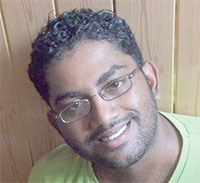LET’S be real. Couples made up of two writers or two artists seem to be a rare thing. Perhaps it has to do with the clash of artistic egos. Perhaps it has to do with the bringing together of two (usually) tempestuous personalities. Perhaps differences in ideologies and belief systems come to the fore. Whatever the reason, most artists that I know, seem to function better in relationships that comprise of an artist and a non-artist.
Sometimes, the route towards becoming a couple is one littered with a variety of missteps, slips-of-the-tongue, faux pas, and miscommunications – many of which emerge from society’s misunderstanding of the role of the artist or writer, especially since dating might be an especially accurate way of measuring how much society misunderstands writers and artists, due to the fact that dating essentially forces the said writer or artist into very close contact with various elements, identified as the other persona on the date, that represent other non-artistic segments of society: the student body, the unemployed, the government workers, those in the medical field, etc. Each date, whether it successfully transcends into an actual relationship often brings with it a number of verbal cues which indicate how the other person feels about artists, which, as stated before, may be indicators of how society feels about artists.
1) “So you write…like poetry and thing?”
The problem with this statement is often the flippant way in which the speaker says it, almost as if to indicate, firstly, that writing poetry is not a worthwhile endeavour. It indicates that the speaker regards poetry as frivolous and not serious in any way. Obviously, this is an important marker for the way poetry as a form of literature is viewed in this country. It has long been seen as nothing more than meant for entertainment purposes, with many people not recognising the hard work, time, energy, and awareness of a true purpose that goes into making poems.
Secondly, this statement is also problematic because it immediately discards all of the other writing forms that writers engage in. Why is poetry the default? It could be because spoken word poetry has had some presence on local stages. Poetry performances are known and, therefore, poetry is recognised as a category of writing, being the most popular to the masses. However, if people think that all writers write poetry, then this is an issue because the society needs to be able to understand that stories, novels, plays, and songs also exist within our repertoire and those skills are also worthy of recognition. It is not enough for all of us to be subsumed under the category of poetry, simply because that is not all that we do. To me, anyone who says the statement above on a first date is immediately letting me know that he/she is an individual with a certain kind of narrow-mindedness and lack of appreciation for the diversity of art, the sort of person that I do not have the energy it takes to educate.
2) “So…when we getting this book?” or “The book coming out soon or what?”
I don’t say to doctors: “So, have you ever operated on someone’s brain before and therefore ended up saving the life of the patient and the wellbeing of all his/her children?” I don’t say to lawyers: “So, have you helped to free your client and therefore assisted in restoring the former glory of the client’s life before he/she was arrested?” This is because it is not kind to approach people and their careers by focusing on the ultimatum of that career, by focusing on the best possible outcome that exists in that particular occupation.
The reasons for this are simple. Life is hard and many of us struggle to just get by one day at a time, making our small contributions and wishing that our contributions to life and to society can mean more, can be more significant in some way. For writers and other artists, the need for significance is even more pronounced, given that it is already a difficult thing to land an agent or a publishing opportunity, or to even persuade people that what we do is worthwhile. Writers and artists are at a disadvantage in society, and when society approaches us with the ultimate goals that we wish for ourselves without being cognisant of how much it would take to achieve what we want, it ends up being just another opportunity that reminds us of how much more we still have to do before we can achieve anything close to our deepest desire. Anyone who asks me either of the two statements above on a date is clearly expressing an ignorance of what it means to be an artist, and ignorance is never attractive.
3) “Can you please write a poem/story for my child’s schoolwork/my friend’s birthday card/my placard for something I’m advocating for [or any other random thing]?”
This, quite honestly, is so annoying – especially because almost always, the other person expects you to do it for free. Creating literature is an art-form and it should be respected as such. Writers are not always able to churn out rhymes whenever it is asked of them – and it is quite unfair to burden them with such an expectation. Good art takes time and to hurry an artist into creating something that you need immediately is to disrespect both the artist and his/her craft.
Furthermore, the utilitarian nature of these kinds of requests is also disrespectful because it reduces art into something basic, common, and entirely devoid of that sense of being special that art invokes. Anyone who seeks to reduce art this way on a date deserves to be walked out on, left alone at the table, and made to cover the entire bill.
Dating is hard, but when you’re a writer and there is the potential that your romantic interest is a self-serving, ignorant, narrow-minded being, it is definitely best to know this upfront by being able to identify the warning signs.



.jpg)








